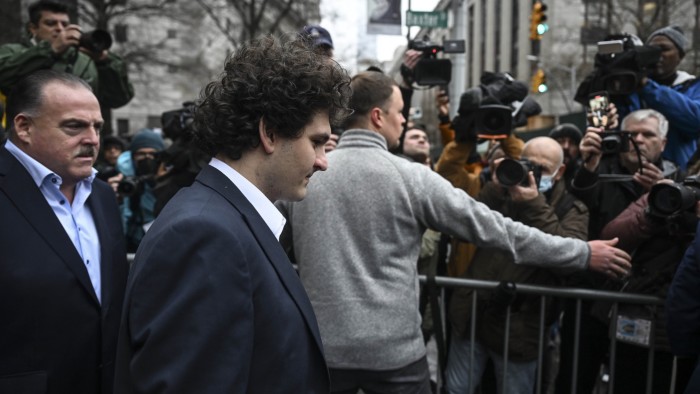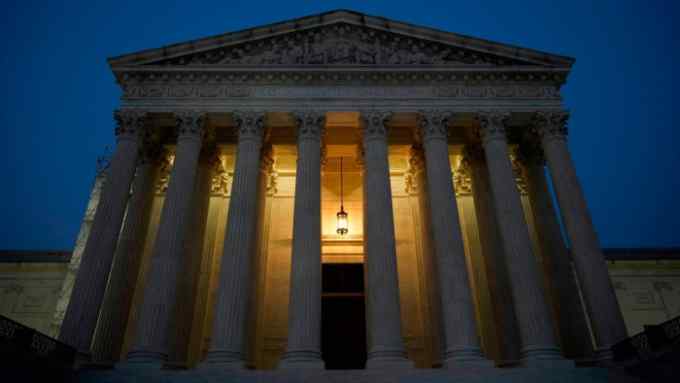FTX founder Sam Bankman-Fried failed ‘likeability’ test at trial

Roula Khalaf, Editor of the FT, selects her favourite stories in this weekly newsletter.
During the murder trial in Albert Camus’s The Stranger, when prosecutors decry the emptiness of Meursault’s soul, the emotionally stunted defendant says the proceedings have denied him “the right to show any feeling or goodwill” to the jurors deciding his fate.
And, as the case against Sam Bankman-Fried reached its conclusion last month, the 31-year-old former crypto wunderkind — who had watched for weeks as three of his closest friends and colleagues painted him as a conniving fraudster — doubtless felt similarly deprived.
Like Meursault, Bankman-Fried had taken the decision to testify in his own defence, almost certainly against the advice of his lead lawyer Mark Cohen. Also like Meursault, he did so to no avail.
What may have worked in Silicon Valley and on Capitol Hill, where the MIT graduate’s “maths nerd” mumblecore act once played to rave reviews, fell disastrously flat in the austere, mahogany-panelled New York courtroom.
During hours of gruelling questions, Bankman-Fried claimed not to recall crucial events or petulantly refused to provide binary responses to simple queries. To the white-collar criminal defence bar, this underlined the fact that exposing a client to cross-examination is almost never a gamble worth taking.
If the aim was to win over the three men and nine women who made up the jury in Lower Manhattan, it backfired spectacularly: a guilty verdict on all counts was returned after just over four hours of deliberation.
There is, of course, little to suggest that Bankman-Fried stood a chance of being exonerated, even if he had kept his counsel.
“I don’t think the results would have been any different, had he stayed off the witness stand,” says Cheryl Bader, a former federal prosecutor who is now associate professor of law at Fordham University.
“The prosecution had already presented extremely damning evidence. They had testimony, texts, emails supporting that testimony of long, reflective conversations between Bankman-Fried and his closest associates.”
Yet, as Cohen had attempted to get the court to acknowledge, in the days leading up to the trial, Bankman-Fried was at a disadvantage from the very start.
For all the legal accoutrements that adorn US criminal cases, a defendant’s testimony is often a high-stakes popularity contest played out in front of 12 ordinary Americans. That, says Bader, is the lesson reinforced by the FTX case. “Like a lot of life, if you are charismatic and a more attractive person, and [you are] seen as more credible and likeable, that yields rewards,” she notes.
Tom Barrack — the real estate investor and early financial backer of Donald Trump’s 2016 presidential run — was acquitted last November of illegal lobbying charges after he managed to portray himself as being aghast at the former president’s demagoguery, and as an ordinary citizen with political concerns.
A year earlier, white teenager Kyle Rittenhouse was found not-guilty of killing two men in Kenosha, Wisconsin, having convulsed with tears on the witness stand, during testimony in which he said he was acting in self-defence after travelling armed to the town, to counter-protesters in the wake of police shooting a black man.
Bankman-Fried was not able to appeal in either way, even when his life was on the line. The author Michael Lewis’s assessment of the entrepreneur with whom he spent many hours both before and after the collapse of FTX was that “other people felt emotions; he did not”.
Caroline Ellison, the FTX founder’s former girlfriend, had testified that Bankman-Fried “thought that the only moral rule that mattered was doing whatever would maximise utility”.
These impressions were not shifted by Bankman-Fried’s matter-of-fact confession that relationships, in general, were not something he had “been great at”. Remorse was not on the cards.
However, Judge Lewis Kaplan had denied a request by the defence for the panel to be told that the former billionaire lives with attention-deficit hyperactivity disorder, which affects his “body language, or eye contact”.
Bankman-Fried, who fidgets and looks away when answering questions, is renowned for having played video games during TV interviews for FTX. He was on prescription amphetamines for the duration of the trial to manage his ADHD symptoms.
But even a jury made aware of this would not have got an insight into Bankman-Fried’s “Robinhood” defence — which he tried to peddle in media appearances before and after his indictment last December.
No doubt wary of being cross-examined on the topic, Bankman-Fried offered no evidence of his purported motive for seeking to quickly make billions of dollars off his cryptocurrency businesses: namely, in order to eventually give it all away.
The “effective altruism” movement to which he and his co-workers, including Ellison, adhered, was never mentioned at trial.
On several occasions, Bankman-Fried offered to “explain if you want” and elaborate on certain answers for the prosecution. Unsurprisingly, the offer was almost never taken up by assistant US attorney Danielle Sassoon.
All of the above were foreseeable reasons not to take the stand.
Vincent Cohen, a partner at Dechert who spent years as a federal prosecutor before becoming the acting US attorney for the District of Columbia, says being a defence lawyer is “like banking, you have to KYC” — referring to regulatory shorthand for “know your customer”, or in this case, a client.
Testifying works for defendants who are “very articulate and charismatic and likeable and personable” and who “don’t have three people inside of their company that are testifying against them,” he adds. Bankman-Fried did not fit that bill.
The opinion that he “did not have much to lose” by taking the stand will be tested in March, when Judge Kaplan, who at times made his exasperation at Bankman-Fried’s evasive answers abundantly clear, decides on sentencing. A bad performance on the stage that is a US criminal courtroom could yet condemn him to a lifetime in prison.
Critics have speculated whether Camus’s Meursault — who is damned for not shedding a tear at his mother’s funeral — would today be diagnosed with alexithymia, or a difficulty to express socially appropriate feelings. He, too, would likely fare no better if testifying in front of a modern US jury.

Comments